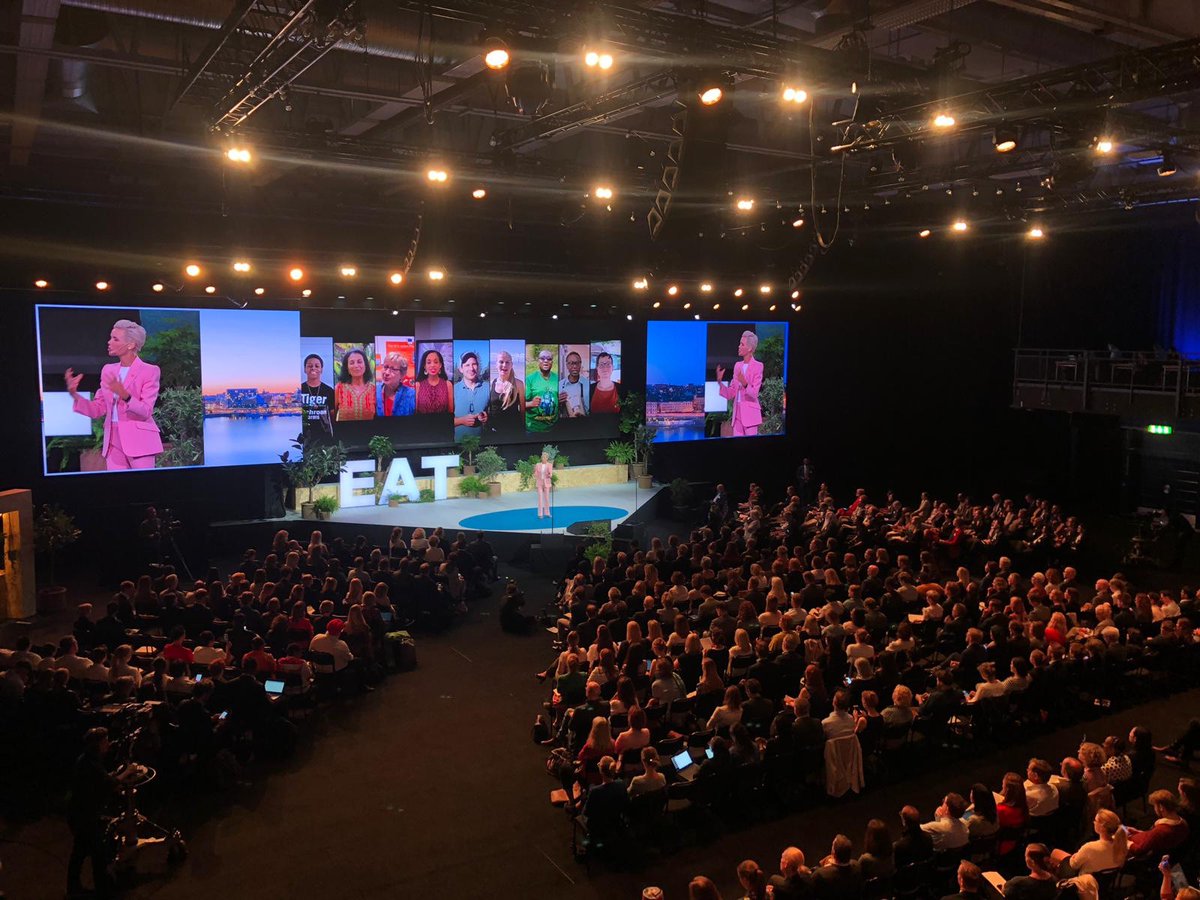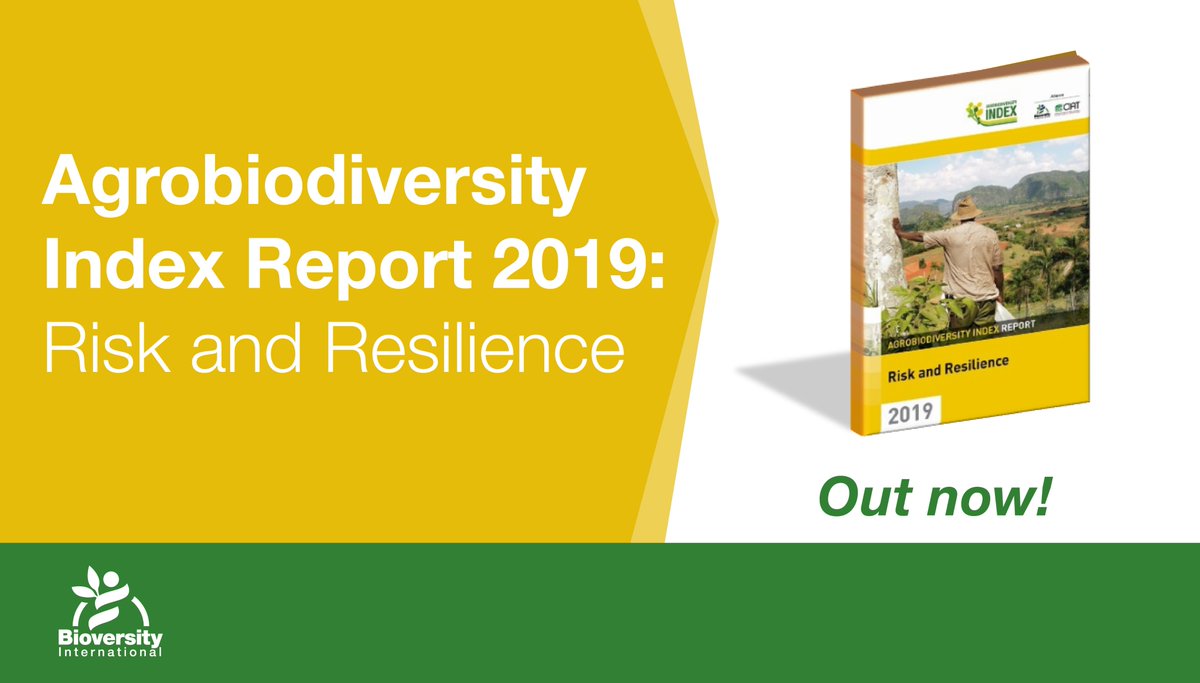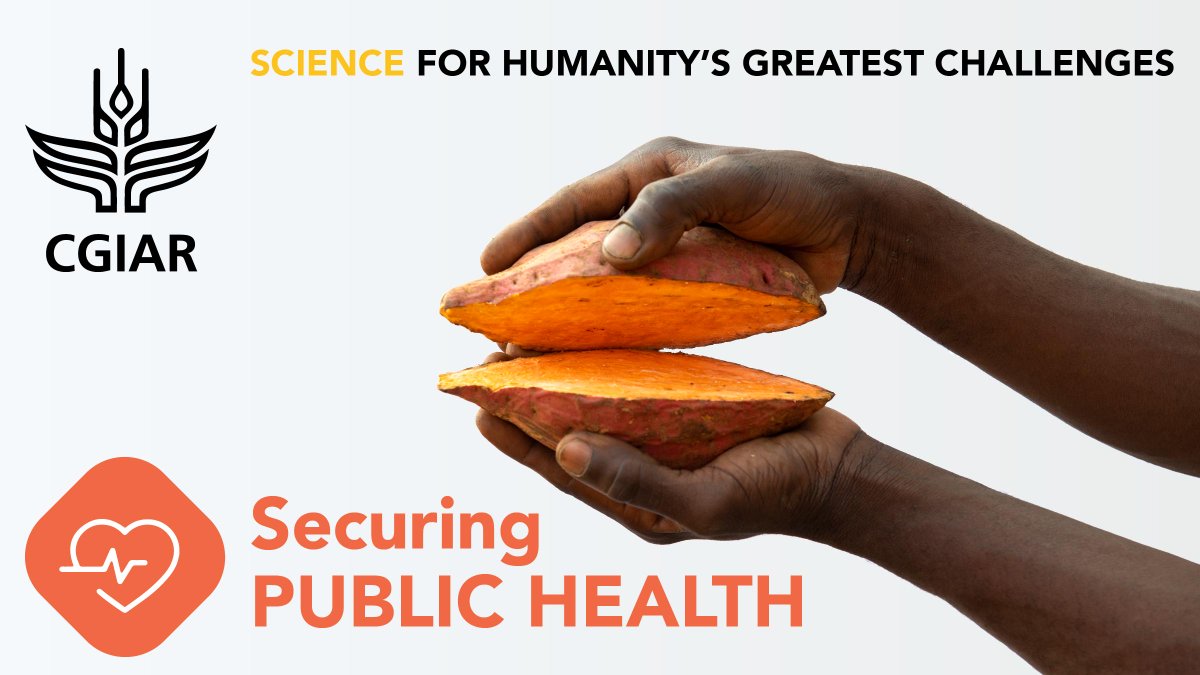 12-13 June 2019. Stockholm, Sweden. EAT Stockholm Food Forum 2019.
12-13 June 2019. Stockholm, Sweden. EAT Stockholm Food Forum 2019.Session on Science based targets for a healthy diet
“The International Center for Biosaline Agriculture (ICBA) is now looking into genomics and is collaborating with
“
BGI Group, is a genome sequencing company, headquartered in Shenzhen, Guangdong
 11 June
11 June
Workshop on Investing in Nutritious, Sustainable Foods in Emerging Markets
 Putting biodiversity back into food – Managing risks in food systems using the Agrobiodiversity Index
Putting biodiversity back into food – Managing risks in food systems using the Agrobiodiversity Index
Hosted by Bioversity International.
Shrinking biodiversity narrows farmers’ options to manage agricultural risks, and reduces our access to diverse diets. The event will discuss the role of biodiversity for sustainable, healthy and resilient food systems, and present the first Agrobiodiversity Index Report 2019: Risk and Resilience. This report includes country results from Australia, China, Ethiopia, India, Italy, Kenya, Nigeria, Peru, South Africa and USA, the first run of this new tool for decision-makers and investors to measure agrobiodiversity in food systems.
Just Transition: Lesson’s from Africa’s most mature multi-stakeholder dialogue platform
South Africa’s food system appears highly efficient but in reality, historic injustices and deep inequalities persist. For the past decade the Southern Africa Food Lab has navigated these divisions, curating processes aimed at surfacing conflicts and generating stretch collaborations. The outcomes, even when seemly misfires, have opened pathways to righting the system.
Food Transformation for All: What can business do to build resilience?
Hosted by: Global Resilience Partnership.
Global Resilience Partnership (GRP) and its partners have been assessing what it takes to deliver resilient food and agriculture systems in vulnerable and fragile states. Speakers will highlight how business can integrate resilience in food value chains benefiting markets and communities in the least developed countries. During interactive sessions, participants identified the actions they can contribute towards equitable food system transformation.
Acting on EAT-Lancet: Science-Based Targets in Practice
The EAT-Lancet Commission provided the first set of global scientific targets for healthy diets and sustainable food production. Translating these global targets into science-based targets (SBTS) is what will make them actionable. Business, cities, and countries all play a role. Much work has already been done in setting SBTs to achieve the Paris Agreement, but SBTs for the food system are lacking.
This session explored the importance of setting SBTs in achieving health and environmental goals, and will highlight various stakeholders’ work at the beginning of the process of setting SBTs that can guide us in transforming the global food system.
Sustainable Diets & Sustainable Farming: The Double-Action Opportunities
Shifts in diets shall only occur if the food environments also change. This includes changes in production patterns, towards diversified, agroecological farming systems, and local food systems. The opportunity is that more plant-based diets, prioritizing locally produced and minimally processed foods, are better for the health both of eaters and of the ecosystems. We need to move away from the current vicious cycle of industrial agriculture and industrially processed foods, towards a virtuous cycle in which supply and demand converge towards sustainability objectives. As illustrated by the EU Common Food Policy project of IPES-Food, a systems-wide approach, in which governance supports cross-sectorial and coordinated action, is a condition for this revolution to occur.
Urban Food Systems Resilience
Bringing the planetary health diet to life will not happen without dedicated efforts in the urban context. Cities are influential for multiple reasons: they are home to growing percentages of the global population and are concentrations of resources, innovation and consumption habits. Ensuring cities are able to provide healthy diets to their residents while supporting sustainable food production requires decisive action on resilience planning, spatial strategies and policy design. This panel showcased examples of actions that increase the health, sustainability, and resilience of urban food systems – including circular economy and design approaches.
Transforming Agriculture: Restoring Hope
While agriculture is now the primary cause of land degradation and loss of biodiversity, it can be our best bet for combating climate change, conserving biodiversity, and improving both quality and quantity of food production. What does it take to do this without placing undue burdens on farmers and farming communities? What changes are needed in producer actions, policy support, and consumer behaviors to actuate this transformation?
 13 June
13 June
Setting a new global agricultural innovation agenda: consultation on the CGIAR 2030 plan.
Hosted by: CGIAR System Organization.
The task before us is momentous: a sustainable food systems revolution – as urgent as the agricultural revolution that launched the CGIAR, yet exponentially more complex. Most of the world eats too little, too much, or the wrong type food – at an unsustainable cost to environment and human health. This important consultation will seek inputs to CGIAR’s research agenda, delivery models, and partnerships needed to deliver on the SDGs.
Redesigning Our Tomorrow: Regional Food Policies
A global food systems transformation requires transformational efforts at all levels of society from small, local communities to the levels of municipalities, cities, states, nations and whole regions. This panel features leaders and experts spanning the rural to the urban and continental spheres who will speak to the importance of regional food policies in (re)designing the food systems of the future and how, based on past experience and best practices, these theories and maps of change can be adapted and disseminated in other global contexts.
Road testing healthy diets: Perspectives from the Global South
Hosted by: CGIAR
This session will provide an entry point to examine the EAT-Lancet recommendations from a low- and medium-income countries perspective where most food is grown by small-scale producers. It will look at gender-equitable approaches to the sustainable intensification of small-scale farming, expanding access to markets and the implications of the global diet on health and nutrition outcomes in societies characterized by rapid urbanization and population growth.
Source: PAEPARD FEED
by secretary
by secretary
by secretary
by secretary
by secretary
by secretary
by secretary
by secretary
by secretary
by secretary
by secretary
by secretary
by secretary
by secretary
by secretary
by secretary
by secretary
by secretary
by secretary
by secretary
by secretary
by secretary
by secretary
by secretary
by secretary
by secretary
by secretary
by secretary
by secretary
by secretary
by secretary
by secretary
by secretary
by secretary
by secretary
by secretary
by secretary
by secretary
by secretary
by secretary
by secretary
by secretary
by secretary
by secretary
by secretary
by secretary
by secretary
by secretary
by secretary
by secretary
by secretary
by secretary
by secretary
by secretary
by secretary
by secretary
by secretary
by secretary
by secretary
by secretary
by secretary
by secretary
by secretary
by secretary
by secretary
by secretary
by secretary
by secretary
by secretary
by secretary
by secretary
by secretary
by secretary
by secretary
by secretary
by secretary
by secretary
by secretary
by secretary
by secretary
by secretary
by secretary
by secretary
by secretary
by secretary
by secretary
by secretary
by secretary
by secretary
by secretary
by secretary
by secretary
by secretary
by secretary
by secretary
by secretary
by secretary
by secretary
by secretary
by secretary
by secretary
by secretary
by secretary
by secretary
by secretary
by secretary
by secretary
by secretary
by secretary
by secretary
by secretary
by secretary
by secretary
by secretary
by secretary
by secretary
by secretary
by secretary
by secretary
by secretary
by secretary
by secretary
by secretary
by secretary
by secretary
by secretary
by secretary
by secretary
by secretary
by secretary
by secretary
by secretary
by secretary
by secretary
by secretary
by secretary
by secretary
by secretary
by secretary
by secretary
by secretary
by secretary
by secretary
by secretary
by secretary
by secretary
by secretary
by secretary
by secretary
by secretary
by secretary
by secretary
by secretary
by secretary
by secretary
by secretary
by secretary
by secretary
by secretary
by secretary
by secretary
by secretary
by secretary
by secretary
by secretary
by secretary
by secretary
by secretary
by secretary
by secretary
by secretary
by secretary
by secretary
by secretary
by secretary
by secretary
by secretary
by secretary
by secretary
by secretary
by secretary
by secretary
by secretary
by secretary
by secretary
by secretary
by secretary
by secretary
by secretary
by secretary
by secretary
by secretary
by secretary
by secretary
by secretary
by secretary
by secretary
by secretary
by secretary
by secretary
by secretary
by secretary
by secretary
by secretary
by secretary
by secretary
by secretary
by secretary
by secretary
by secretary
by secretary
by secretary
by secretary
by secretary
by secretary
by secretary
by secretary
by secretary
by secretary
by secretary
by secretary
by secretary
by secretary
by secretary
by secretary
by secretary
by secretary
by secretary
by secretary
by secretary
by secretary
by secretary
by secretary
by secretary
by secretary
by secretary
by secretary
by secretary
by secretary
by secretary
by secretary
by secretary
by secretary
by secretary
by secretary
by secretary
by secretary
by secretary
by secretary
by secretary
by secretary
by secretary
by secretary
by secretary
by secretary
by secretary
by secretary
by secretary
by secretary
by secretary
by secretary
by secretary
by secretary
by secretary
by secretary
by secretary
by secretary
by secretary
by secretary
by secretary
by secretary
by secretary
by secretary
by secretary
by secretary
by secretary
by secretary
by secretary
by secretary
by secretary
by secretary
by secretary
by secretary
by secretary
by secretary
by secretary
by secretary
by secretary
by secretary
by secretary
by secretary
by secretary
by secretary
by secretary
by secretary
by secretary
by secretary
by secretary
by secretary
by secretary
by secretary
by secretary
by secretary
by secretary
by secretary
by secretary
by secretary
by secretary
by secretary
by secretary
by secretary
by secretary
by secretary
by secretary
by secretary
by secretary
by secretary
by secretary
by secretary
by secretary
by secretary
by secretary
by secretary
by secretary
by secretary
by secretary
by secretary
by secretary
by secretary
by secretary
by secretary
by secretary
by secretary
by secretary
by secretary
by secretary
by secretary
by secretary
by secretary
by secretary
by secretary
by secretary
by secretary
by secretary
by secretary
by secretary
by secretary
by secretary
by secretary
by secretary
by secretary
by secretary
by secretary
by secretary
by secretary
by secretary
by secretary
by secretary
by secretary
by secretary
by secretary
by secretary
by secretary
by secretary
by secretary
by secretary
by secretary
by secretary
by secretary
by secretary
by secretary
by secretary
by secretary
by secretary
by secretary
by secretary
by secretary
by secretary
by secretary
by secretary
by secretary
by secretary
by secretary
by secretary
by secretary
by secretary
by secretary
by secretary
by secretary
by secretary
by secretary
by secretary
by secretary
by secretary
by secretary
by secretary
by secretary
by secretary
by secretary
by secretary
by secretary
by secretary
by secretary
by secretary
by secretary
by secretary
by secretary
by secretary
by secretary
by secretary
by secretary
by secretary
by secretary
by secretary
by secretary
by secretary
by secretary
by secretary
by secretary
by secretary
by secretary
by secretary
by secretary
by secretary
by secretary
by secretary
by secretary
by secretary
by secretary
by secretary
by secretary
by secretary
by secretary
by secretary
by secretary
by secretary
by secretary
by secretary
by secretary
by secretary
by secretary
by secretary
by secretary
by secretary
by secretary
by secretary
by secretary
by secretary
by secretary
by secretary
by secretary
by secretary
by secretary
by secretary
by secretary
by secretary
by secretary
by secretary
by secretary
by secretary
by secretary
by secretary
by secretary
by secretary
by secretary
by secretary
by secretary
by secretary
by secretary
by secretary
by secretary
by secretary
by secretary
by secretary
by secretary
by secretary
by secretary
by secretary
by secretary
by secretary
by secretary
by secretary
by secretary
by secretary
by secretary
by secretary
by secretary
by secretary
by secretary
by secretary
by secretary
by secretary
by secretary
by secretary
by secretary
by secretary
by secretary
by secretary
by secretary
by secretary
by secretary
by secretary
by secretary
by secretary
by secretary
by secretary
by secretary
by secretary
by secretary
by secretary
by secretary
by secretary
by secretary
by secretary
by secretary
by secretary
by secretary
by secretary
by secretary
by secretary
by secretary
by secretary
by secretary
by secretary
by secretary
by secretary
by secretary
by secretary
by secretary
by secretary
by secretary
by secretary
by secretary
by secretary
by secretary
by secretary
by secretary
by secretary
by secretary
by secretary
by secretary
by secretary
by secretary
by secretary
by secretary
by secretary
by secretary
by secretary
by secretary
by secretary
by secretary
by secretary
by secretary
by secretary
by secretary
by secretary
by secretary
by secretary
by secretary
by secretary
by secretary
by secretary
by secretary
by secretary
by secretary
by secretary
by secretary
by secretary
by secretary
by secretary
by secretary
by secretary
by secretary
by secretary
by secretary
by secretary
by secretary
by secretary
by secretary
by secretary
by secretary
by secretary
by secretary
by secretary
by secretary
by secretary
by secretary
by secretary
by secretary
by secretary
by secretary
by secretary
by secretary
by secretary
by secretary
by secretary
by secretary
by secretary
by secretary
by secretary
by secretary
by secretary
by secretary
by secretary
by secretary
by secretary
by secretary
by secretary
by secretary
by secretary
by secretary
by secretary
by secretary
by secretary
by secretary
by secretary
by secretary
by secretary
by secretary
by secretary
by secretary
by secretary
by secretary
by secretary
by secretary
by secretary
by secretary
by secretary
by secretary
by secretary
by secretary
by secretary
by secretary
by secretary
by secretary
by secretary
by secretary
by secretary
by secretary
by secretary
by secretary
by secretary
by secretary
by secretary
by secretary
by secretary
by secretary
by secretary
by secretary
by secretary
by secretary
by secretary
by secretary
by secretary
by secretary
by secretary
by secretary
by secretary
by secretary
by secretary
by secretary
by secretary
by secretary
by secretary
by secretary
by secretary
by secretary
by secretary
by secretary
by secretary
by secretary
by secretary
by secretary
by secretary
by secretary
by secretary
by secretary
by secretary
by secretary
by secretary
by admin
by admin
by admin
by admin
by admin
by admin
by admin
by admin
by admin
